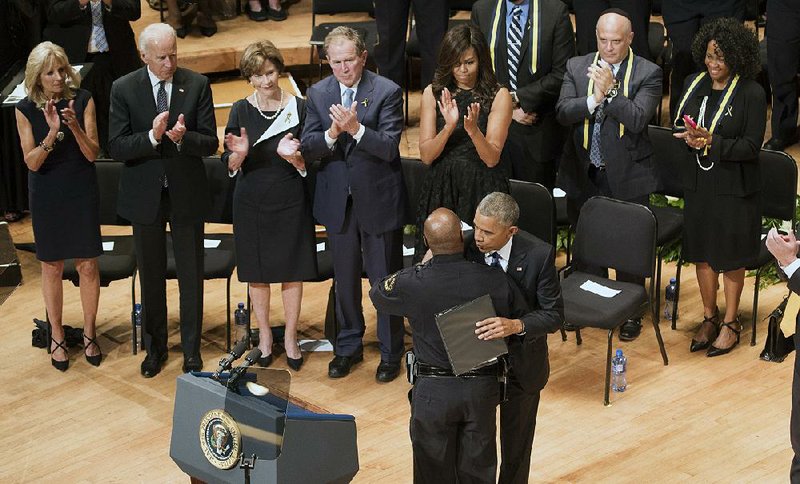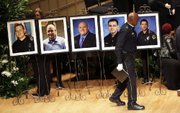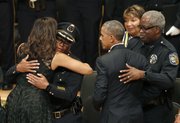DALLAS -- President Barack Obama on Tuesday again addressed a city heartbroken by a mass shooting.
RELATED ARTICLE
http://www.arkansas…">Baton Rouge guns' theft said to target police; 3 arrested
Sharing the stage with former President George W. Bush at a memorial service, Obama praised the work of the five officers killed in Dallas when a gunman opened fire Thursday as marchers peacefully protested the police killings of two black men.
"Your work, the work of police officers across the country, is like no other," Obama told the packed hall that was full of law enforcement officers from across the state and beyond. "From the moment you put on that uniform, you have answered a call that at any moment, even in the briefest interaction, may put your life in harm's way."
Obama echoed what the Dallas police chief said a day earlier -- that the nation places a burden on police departments that is too great.
"So much of the tensions between police departments and minority communities that they serve is because we ask the police to do too much and we ask too little of ourselves," he said.
"We tell them to keep those neighborhoods in check at all costs and do so without causing any political blow-back or inconvenience. 'Don't make a mistake that might disturb our own peace of mind,' and then we feign surprise when periodically the tensions boil over."
Several other mass shootings have occurred during Obama's presidency -- like the ones at a school in Newtown, Conn., a church in Charleston, S.C., and an office party in San Bernardino, Calif.
"I'm not naive," Obama said. "I've spoken at too many memorials during the course of this presidency. I've hugged too many families that lost a loved one to senseless violence."
He said he has seen how inadequate words can be in bringing about change. But if America "is to honor these five outstanding officers we lost," then the country must be honest about confronting its challenges going forward, he said.
He rejected the suggestion that all police are biased or bigoted, and criticized people who call for violence against officers. He said race relations have improved dramatically in the past 50 years, but "we know that bias remains." He said people simply cannot dismiss protesters and those who question law enforcement's tactics.
"We can learn to stand in each other's shoes and look at the world through each other's eyes, so that maybe the police officer sees his own son in that teenager with a hoodie who's kind of goofing off but not dangerous," he said. "And the teenager -- maybe the teenager will see in the police officer the same words and values and authority of his parents."
He urged Americans to put aside despair and doubt and replace it with faith in the nation's institutions and progress.
"Dallas, I'm here to say we must reject such despair. I'm here to insist that we are not as divided as we seem. And I know that, because I know America. I know how far we've come against impossible odds," he said.
He called the Dallas shootings "an act not just of demented violence but of racial hatred," and he touched on the protests and unrest elsewhere in a nation that remains on edge after last week's three-day stretch of fatal shootings by and of police.
Tuesday's interfaith memorial service honored the officers killed when 25-year-old Micah Johnson opened fire late Thursday on the peaceful rally downtown.
During the service in the Morton H. Meyerson Symphony Hall, five seats were left open -- one for each of the officers killed: Brent Thompson, a 43-year-old newlywed; Patrick Zamarripa, 32, a Navy veteran who served in Iraq; Michael Krol, 40, an athlete and basketball lover; Michael Smith, 55, a former Army Ranger and father of two; and Lorne Ahrens, whose wife is a police detective.
Dallas Mayor Mike Rawlings said during his remarks that the seats were reserved for those who "died for that cause" of protecting others.
Last week, "the soul of our city was pierced," Rawlings said.
At Tuesday's service, he recognized the president and first lady, Michelle Obama, and several other officials, including Bush, who attended with his wife, Laura; Vice President Joe Biden and his wife, Jill; and Dallas Police Chief David Brown.
At the end of the service, the group of dignitaries stood on stage and held hands in a display of unity as a choir sang "The Battle Hymn of the Republic."
'Your loss is unfair'
Bush, the nation's 43rd president and a former governor of Texas, moved to Dallas after leaving the White House.
"Today the nation grieves," Bush said in his remarks at Tuesday's memorial service. "But those of us who love Dallas and call it home have had five deaths in the family."
He also spoke the names of each of the five slain officers and included a detail about each of them. He said the officers had accepted a calling that set them apart from others.
"All of us feel a sense of loss, but not equally," Bush said. He then directly addressed the families of the slain officers: "Your loss is unfair. We cannot explain it. We can stand beside you and share your grief."
Bush referred to the nation's divisions.
"Too often we judge other groups by their worst examples while judging ourselves by our best intentions, and this has strained our bonds of understanding and common purpose," he said.
Rawlings, the Dallas mayor, said as he arrived for the memorial service: "We are all brothers today."
Hundreds of police officers, mostly wearing black, hugged and took photographs with one another as they waited to be allowed into the building.
Inside the hall, rows of seats were reserved for police officers. Five poster-sized photographs of the slain officers sat on the stage. Meanwhile, a choir of about 200 blacks, whites, Asians and Hispanics rehearsed "The Battle Hymn of the Republic" backstage.
Officers from across Texas arrived to support their fallen colleagues. They dressed in full regalia as a sign of respect, with black ribbons across their badges. On the ribbons was the word "Dallas" in white letters.
The attendees also wore blue-and-yellow satin sashes over their shoulders and across their chests. The mood in the hall was that of both a funeral and a reunion, as officers hugged and greeted one another.
"It reminds us that it could be any one of us, of our brothers and sisters in law enforcement who are out every day," Lorenzo Garza, a deportation officer with the U.S. Immigration and Customs Enforcement, said Tuesday.
Quentin Draper, a pastor at the Spirit and Truth Church in nearby Oak Cliff, said Obama's visit was "right on time." Draper said the children of his parish had been markedly affected by the chaos of the past week.
"Many of our kids are quite afraid, so we're spending time talking to them about the importance of law enforcement and the importance of our relationship with law enforcement," Draper said, standing with his young daughter.
Meetings with families
During the flight to Dallas, Obama called the families of Alton Sterling, who was fatally shot by police in Baton Rouge last Tuesday, and of Philando Castile, who was killed last Wednesday by a police officer in suburban St. Paul, Minn. He offered condolences on behalf of the American people, said Josh Earnest, the White House spokesman.
After his speech at Tuesday's service, the president and first lady spent more than an hour meeting privately with the slain officers' families and with many of those who were wounded Thursday, the White House said. The Bidens and the Bushes also participated in those meetings.
On Tuesday as U.S. Attorney General Loretta Lynch testified before a congressional committee, she said in prepared remarks: "As we grapple with the aftermath of these events, the Department of Justice will continue to do everything in our power to build bonds of trust and cooperation between law enforcement and the communities we serve."
"That work has never been more difficult -- or more important."
Late Tuesday, House Speaker Paul Ryan told CNN that he is forming a new bipartisan group in the House to examine policing issues in the U.S.
Ryan said he has spoken with members of the Congressional Black Caucus and others on how to come up with solutions. House GOP aides said more information would be made public today.
Meanwhile, Republican presidential candidate Donald Trump said he believes that relations between police and the nation's black community are "far worse" than people think. He predicted that protests against police violence "might be just the beginning for this summer."
In an interview Monday, he said a lack of training for officers might be at least partially to blame for the deaths of Castile and Sterling.
"I thought they were horrible, horrible to witness," Trump said, referring the videos that showed one of the shootings and the aftermath of the other. "Whether that's a lack of training or whatever, but I thought they were two incidents that were absolutely horrible to witness. At the same time, our country is losing its spirit. African-Americans are absolutely losing their spirit."
Trump went on to predict that the problem will only grow worse.
"When President Obama said the other day that he doesn't think it's as bad as people think, I think it's far worse and certainly far worse than he believes it is," Trump said. "We are in a divided nation. I looked two nights ago, and you were having trouble in 11 different cities, big, big trouble. And the press actually plays it down."
Information for this article was contributed by Keith L. Alexander, Mark Berman, Brian Murphy, Louisa Loveluck, Juliet Eilperin, Peter Hermann and Dana Hedgepeth of The Washington Post; and by Darlene Superville, Kathleen Hennessey, Jill Colvin and Matthew Daly of The Associated Press.
A Section on 07/13/2016



